Africa Command Revamps Multinational, Interagency Cooperation Strategies
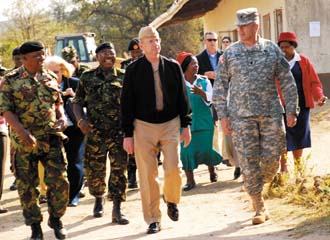 |
S.S. Dlamini (l), commander, Umbutfo Swaziland Defence Force, Vice Adm. Robert T. Moeller, USN (c), deputy to the commander for military operations, U.S. Africa Command (AFRICOM), and Lt. Col. Michael Money, USA, 212th Combat Medical Hospital, lead a tour of the Kazinyane school in North Eastin Hhohho during a medical exercise. The bilateral exercise between U.S. representatives and Swaziland is designed to enhance medical capacity, strengthen disaster preparedness and provide medical, dental and veterinary services. |
The latest combatant command to join the ranks in the U.S. Defense Department has set out on a different mission than its well-established brethren. From its very conception, the U.S. Africa Command has been designed to help the nations in its area of responsibility to help themselves. Since its inception two years later, it has been fulfilling that vision with assistance from other
The differences between the U.S. Africa Command (AFRICOM) and other unified commands begin with its command structure. Instead of a single deputy commander, AFRICOM Commander Gen. William E. Ward,
Adm. Moeller came to AFRICOM from his position as special assistant to the commander of U.S. Central Command. His work at AFRICOM began not on the ground floor but on building the foundation: From February until September 2007, he served as the executive director of the AFRICOM Transition Team. The admiral assumed his current position when the command reached initial operational capability in October 2007; the command’s headquarters achieved full operational capability in
According to Adm. Moeller, the Defense Department decided to create AFRICOM for two primary reasons. First, the department recognized the growing strategic importance of “all things related to
“Now, the needs, concerns and priorities of the African nations are not only our lone priority, they are our number one priority. With the establishment of the command, we are now in a position to do that. We are totally focused on what matters to them,” the admiral says.
Although most of the other nine COCOMs have been positioning themselves to work with other governmental agencies, AFRICOM has made a solid commitment. Half of the approximately 1,300 command personnel are Defense Department civilian employees, and representatives from a number of other federal government departments also work on site. The organizations include the
This new design was a fundamental part of planning AFRICOM. The structure is a way to ensure that the command can reach out—at a fairly senior level—to agencies across the
The combination of the vast area of responsibility and the necessity to work with other agencies requires AFRICOM to rely on technologies and resources that are less traditional than those found in other COCOMs. With the exception of areas immediately near coastlines, the continent has extremely limited terrestrial capabilities. As a result, members of the command rely heavily on satellite communications. In addition, the multitude of languages Africans speak necessitates the ability to communicate with the command’s partners by translating written, spoken and electronic information. Translators and interpreters are engaged for written and spoken communications; the command is working with several technical systems that will enable Internet interaction in multiple languages with many partners at a variety of clearance and need-to-know levels.
As a new command, AFRICOM has been able to take advantage of some of the latest technology advances. Personnel use a variety of devices such as small and lightweight deployable satellite interfaces that provide signal and bandwidth for communications from
Despite access to state-of-the-art capabilities, AFRICOM’s command, control, communications and computers systems (C4S) department continues to evaluate new ways to extend its capabilities to enhance verbal, written and electronic information sharing. C4S personnel accept that no single technology can provide a total solution for the gamut of technological diversity throughout the continent. Consequently, they rely on integrating a number of capabilities daily. Information technology professionals work alongside personnel in
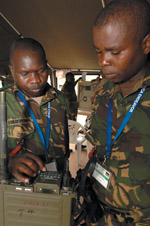 |
During communications testing at the Gabonese Army Camp in Baraka, Gabon, Lt. Winner Sokifuyiwa (l) and Sgt. Charles Kamwana of the Malawi armed forces program high-frequency radios as part of exercise Africa Endeavor. |
This is not the only technological challenge AFRICOM faces to get networking up and running in what used to be called the
“Since the fall of 2006 when the process [to establish AFRICOM] began until now, we have continued to refine our efforts to use our agency partners most effectively,” Adm. Moeller shares. “In general, this is going well. One challenge we face is that while there is great interagency interest to do this, the agencies don’t have the [amount of] personnel they would like to be able to send here. It remains a work in progress as we learn the most effective way for all of our efforts.
“Our focus of effort is to work with the Africans to build their capabilities and capacity to provide for their own security and stability within their countries. The Defense Department’s plan early on [for AFRICOM] was to work with the Africans in a way that we get well ahead of the problem set and head off some of these challenges long, long before we get to the conflict stage,” the admiral states. If it becomes necessary for the
In addition to helping Africans ensure the security of their own nations on land, the command is working with African nations to improve their maritime security capabilities. Countries on the continent recognize that long-term economic development depends to a great extent on secure and stable conditions in the maritime domain, Adm. Moeller notes.
Because part of AFRICOM’s mission is to support
Adm. Moeller agrees with the C4S team that technology is an important complement to their mission; it will become more and more significant in the future. “Technology is what facilitates engagement with the Africans and between countries themselves,” he says. To ensure both training and interoperability, AFRICOM sponsors the Africa Endeavor exercise annually (see page 43).
In addition to needing technologies that support satellite communications, the admiral says that solutions industry offers must take into consideration the environment of the entire African continent—including heavily forested areas. Power consumption also should be considered. The best way for companies to understand the needs of the African nations is to visit them to acquire a sense of the challenges, he adds.
C4S team members agree with the admiral. They point out that it is essential that businesses develop technologies the African partners want and can afford. By listening to African leaders, companies will have a better sense of their capacity and capability to communicate among themselves and with their neighbors.
In the short term, research and development in the area of low-bandwidth, high-capacity satellite communications terminals will help to ensure that AFRICOM will obtain the most effective capability for its current technology. In line with Adm. Moeller’s sentiment, these technologies must be able to be used in austere environments such as deserts, rain forests, jungles and mountains. Equipment must be versatile without performance degradation.
Long-term requirements include nonintrusive infrastructure enhancements. These include the ability to communicate using devices that do not involve extensive overhead infrastructure or can take advantage of existing infrastructures that comprise Category 3 cables or cell tower relays.
Adm. Moeller points out that although the command itself has the technology it needs to have a “good idea of the state of play going on across the continent on a regular basis,” some African nations cannot absorb new solutions at the same pace as the command. This condition requires a great deal of training, he adds.
Although when the COCOM’s concept began there was talk of relocating AFRICOM’s headquarters from
WEB RESOURCES
African
U.N. Economic Commission for
African Growth and Opportunity Act: www.agoa.gov
U.S. Africa Command Photos on YouTube: http://bit.ly/yqPz

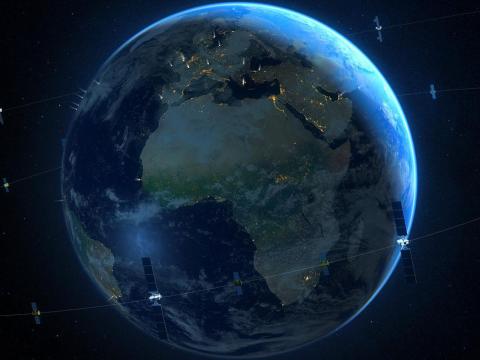
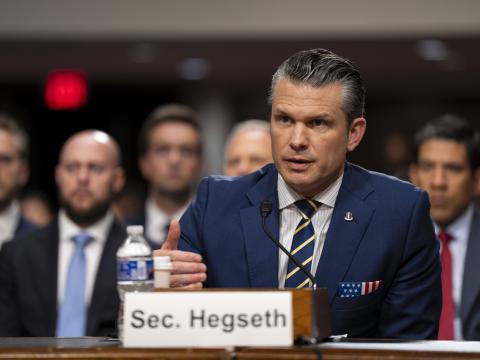
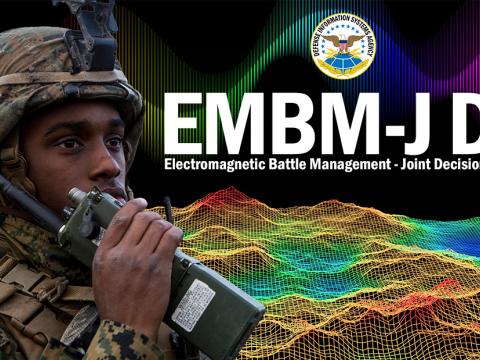
Comments